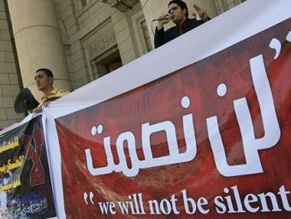|
World Jewish News

Muslim Brotherhoods supporters. Photo by AFP.
|
Egypt's Muslim Brotherhood: People's demands are clear, Mubarak must step down
06.02.2011, Israel and the World A spokesman for Egypt's Muslim Brotherhood spoke to thousands of protesters gathered in Cairo's Tahrir square on Sunday, while the group held talks with the vice president over how to resolve the crisis in Egypt.
"We are starting a round of talks to know how serious they are about responding to the demands of the people," spokesman Gamal Nassar told the German Press Agency dpa. "The demands of the people are clear. Mubarak has to step down."
The statement indicated that the group would not be willing to move forward in negotiations with the government without this demand being met. Protests calling for Egyptian President Hosni Mubarak to end his 30-year reign over the country have continued unabated since January 25th.
The decision by the fundamentalist Brotherhood, which has been outlawed since 1954, to speak with the government comes as Egypt's leadership seeks to defuse the mass demonstrations by proposing reforms but stopping short of the protesters' key demand that Mubarak step down.
The talks are the first known discussions between the government and the Brotherhood in years, suggesting the group could gain an open political role in the post-Mubarak era along with other opposition political parties.
The Brotherhood said in a statement that its representatives would meet with Vice President Omar Suleiman to press its legitimate and just demands.
Suleiman has accused the Brotherhood, businessmen and foreigners he did not identify as being behind a wave of looting and arson that swept much of the country last weekend after security forces inexplicably pulled out from the streets.
Negotiations with the opposition reflect the regime's apparent determination to end the crisis by placating protesters with reforms but keeping Mubarak in office until elections can be held as scheduled in September. The United States shifted signals and gave key backing to the regime's gradual changes on Saturday, warning of the dangers if Mubarak goes too quickly.
Mubarak has promised not to run again but has insisted he will serve out the remainder of his current term to supervise a peaceful transfer of power. He also vowed to introduce far reaching political reform and to fight corruption.
Leaders of Mubarak's ruling National Democratic Party, including his son Gamal and longtime aides, resigned on Saturday. But the concessions so far have failed to satisfy the protesters.
Mubarak's decision to open talks with the Brotherhood is a tacit recognition by his regime of their key role in the ongoing protests as well as their wide popular base.
Suleiman and Prime Minister Ahmed Shafiq have rejected calls for Mubarak's immediate ouster, arguing that demanding his departure was a betrayal of the services he offered the country both as a career air force officer and president.
But senior Brotherhood leader Mohammed Mursi told The Associated Press the group was sticking to the protesters' main condition that Mubarak step down. He also rejected proposals that Suleiman take over from Mubarak on an interim basis to oversee reforms.
The Brotherhood aims to create an Islamic state in Egypt, but insists that it would not force women to cover up in public in line with Islam's teachings and would not rescind Egypt's 1979 peace treaty with Israel. During the recent crisis, the group also has called for a democratic and civic state.
The group, which fields candidates as independents, made a surprisingly strong showing in elections in 2005, winning 20 percent of parliament's seats. However, thousands of its members were arrested in crackdowns over the past decade and it failed to win a single seat in elections held late last year. The vote was heavily marred by fraud that allowed the National Democratic Party to win all but a small number of the chamber's 518 seats.
Some opposition leaders met with Suleiman on Saturday but said there was no breakthrough.
Haaretz.com
|
|
